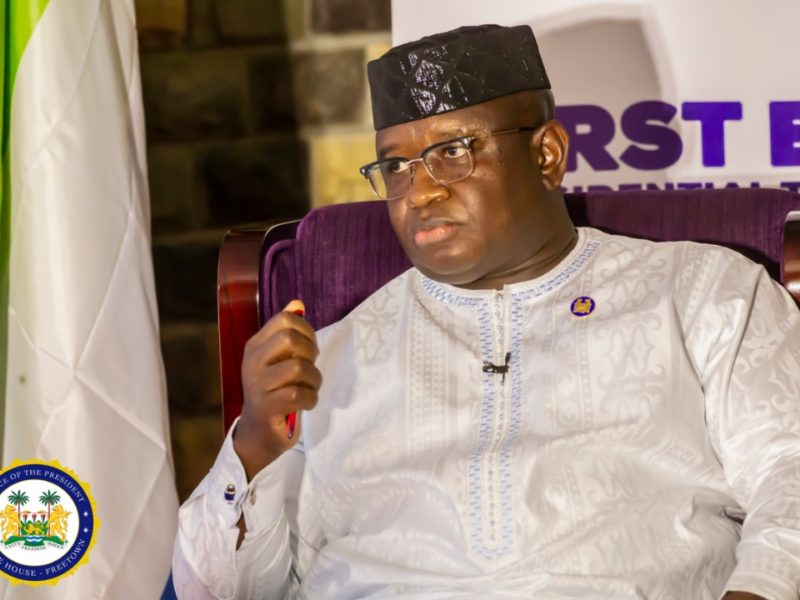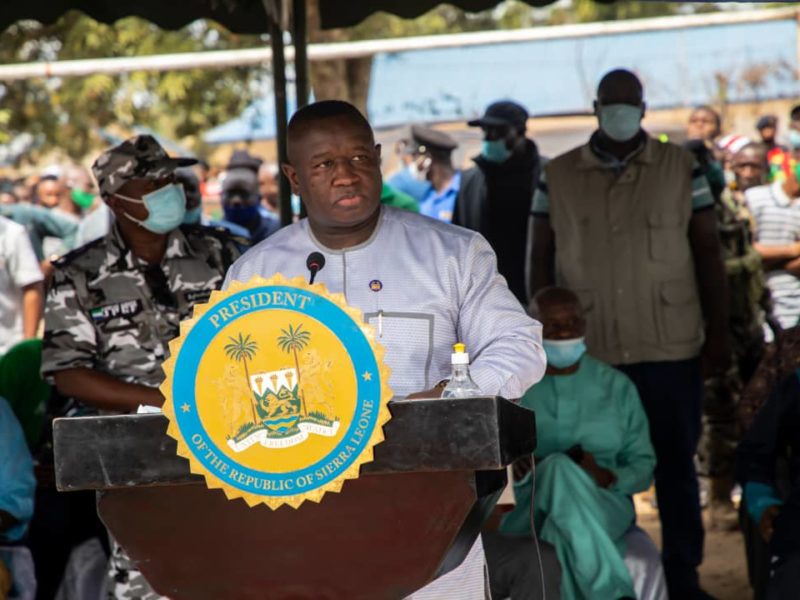Sustainable growth through agriculture
Strong governance indicators transcend meeting the core values of democracy; like free speech; promoting an open government; and ensuring free fair and elections. Successful governance performance takes into account meting those core issues upon which one was elected into office. The surge for sustained growth makes part of democracy, especially from the framework of building on infrastructure, job creation and utilizing a nation’s agriculture to ensure sustained economic growth. From the country level, when we put into perspective all what has been happening in Sierra Leone in the last half a decade, it is acceptable to suggest there are strong legacies President Koroma will be pointing to, in his life after mainstream politics. And the need to sustain those legacies is very important. The President’s legacies in agriculture should be sustained and protected for a better tomorrow. (Photo; John Pa Baimba Sesay, IA, China)
Sierra Leone’s agriculture sector has continued to enjoy serious government attention, especially under the current government of President Koroma since his election in 2007. President Koroma, in 2012, stated, that during his first term in office, efforts were embarked upon that saw the creation of the National Sustainable Agricultural Development plan- a national platform for increasing agricultural productivity, promoting commercial agriculture through extension delivery systems and promoting efficient sector resource management.
During the period under review, the Smallholder Commercialization Programme was successfully used to construct over 190 Agricultural Business Centres across the country and equipped with mini rice mills, cassava grating machines, drying floors and water sources to assist small farmers in processing, adding value and marketing their products. This is in addition to feeder roads been rehabilitated and village banks established to facilitate farmers’ access to financial resources and services.
There also are encouraging provisions in the prosperity agenda, Sierra Leone’s current blueprint for sustainable development. This document makes clear provision in terms of what government plans for the agriculture sector and strategies to be used in strengthening our socio-economic growth through this same sector. There is the zest on the part of government to bolster the country’s economy by; strengthening microeconomic and financial management; improving and expanding road infrastructure; promoting job creation and self employment; and promoting industry and trade. But there also, is the crucial role of the agriculture sector, given that scaling up agricultural productivity largely will help augment a country’s economic growth.
Apparently, in 2007 the country identified agriculture as a top development priority. This eventually led to an increase in investment in the sector from a discouraging 1.6% in 2007 to almost 10% of GDP in 2011. The fact also, is that the sector is the backbone of our country’s economy since it contributes about 46% to the Gross Domestic Product as well as supports the livelihood of two thirds of the population.
There also are a number of challenges the sector is faced with; the need to phase out substance farming being one, as well as the need to motivate higher indigenous private sector investment in value addition, large scale agriculture and agro-marketing, coupled with the desire to opening up rural areas to increase access to market and services. There also is the need to build a comprehensive agricultural database and an early warning system for forecasting climatic conditions, pests and diseases, and food security situation in the country. Notwithstanding, we can scale up agricultural productivity by a) sustaining the promotion of commercial agriculture through the Smallholder Commercialization Programme; b) attracting private sector investment in large scale commercial agriculture; c) enhancing year-round cultivation of rice and vegetables through Inland valley Swamp development and irrigation; d) expanding support for mechanization; and; e) enhancing promotion of the agricultural value chain, amongst others.
But it was also in 2012 that President Koroma outlined strategies in meeting these objectives and the core challenges highlighted above. Strategies like; providing investment incentives to the agricultural private sector including foreign direct investors; establishing more Village and Community Banks country-wide and rehabilitate and construct more feeder roads to link production areas to markets; and expanding the tractor hire purchase scheme and complement that with an effective hire scheme for poor farmers who cannot afford hire purchase have all been taken into cognizant.
On the 12th of April, President Koroma was in the provinces to formally open the Industrial Growth Centres as well as to hand over the Agricultural Development Assets to District.
In Bo, the President spoke of how his government will continue to prioritize agriculture especially in terms of working hard to “increase the production of our staple food beyond self-sufficiency, with emphasis on sustainable land and water management to improve yields, promote export crops, promote commercial agriculture along the value chain, link farmers to markets, as well as provide effective rural and agribusiness financing systems that will increase the access of smallholder farmers to finance…” . The President also spoke of how his government has clearly articulated an encouraging vision for the sector as the engine for socio-economic growth, especially through commercialization.
With a clear vision to using the sector in fostering Sierra Leone’s path to sustained growth, President Koroma’s governance term will surely “enhance a productive livestock industry and continue to encourage large-scale private sector investments in agriculture with effective out-grower schemes that will support the Smallholder Commercialization Programme”. Agriculture is a major tool for a country’s growth and it is in line with this that the government will continue to prioritize this sector for the good of Sierra Leone.
Stay with Sierra Express Media, for your trusted place in news!
© 2013, https:. All rights reserved.






